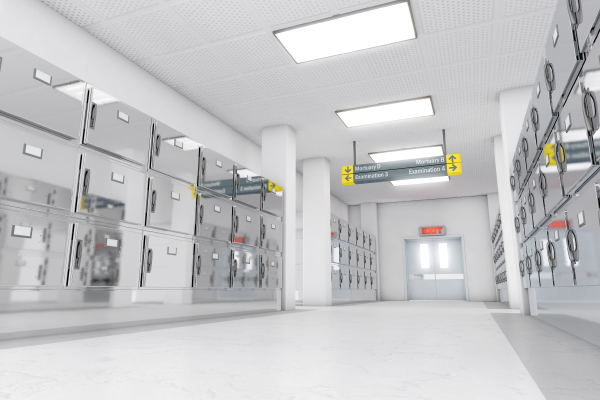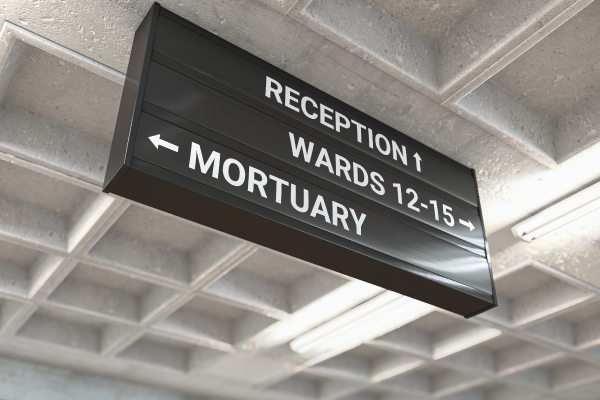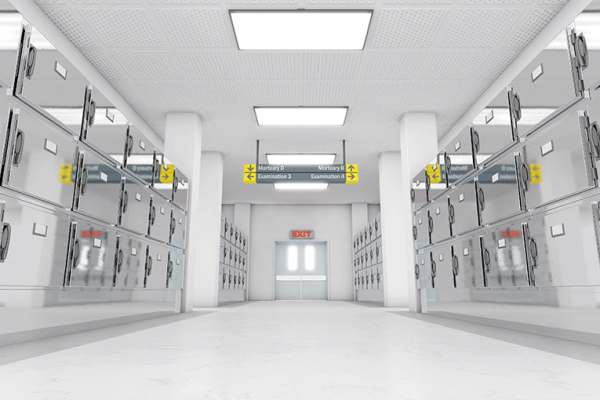What is a mortuary technician?

A mortuary technician, also known as an anatomical pathology technologist (APT), works in the mortuary supporting the pathologist and other healthcare professionals. But what is a mortuary technician and what type of work do they do?
The primary role of a mortuary technician is to assist the pathologist during postmortem examinations. They clean and prepare bodies before post-mortem, deliver tissue samples to the lab for analysis and clean and prepare instruments before and after use.
With experience, they may also be trained to help identify disease progression to establish the cause of death.
A significant part of the role also involves working with the family of the deceased. They arrange for family members to see bodies, return personal items and release the body to funeral directors for burial.
What is a mortuary technician – role and responsibilities
Mortuary technicians typically carry out the following tasks:
- Receive the body of the deceased and prepare it for storage
- Maintain accurate records of the deceased
- Record and securely store the deceased's personal belongings
- Prepare the body for post-mortem
- Support the pathologist during the post-mortem
- Prepare tissue samples and specimens for the lab
- Weigh organs as they are removed and record the findings
- Complete reconstruction of the body ready for burial
- Clean and sterilise all equipment used during the post mortem
- Arrange for relatives to see the body of the deceased
- Provide relatives with the death certificate
- Work with funeral directors to release the body
- With experience a mortuary technician may also carry out the following tasks:
- Be trained to identify disease in organs to help determine the cause of death
- Carry out the day-to-day management of the mortuary
- Train, mentor and support trainee mortuary technicians
How much does a mortuary technician earn?
The salary for a mortuary technician varies depending on experience. A trainee technician falls into Band 3 of the Agenda for Change pay scale. This means they can expect to earn £20,330 with less than 1-years experience and £21,777 with 2+ years.
Once fully qualified technicians move to Band 4, where they can expect to earn between £21,892 - £23,157. Senior mortuary technicians responsible for the management of the mortuary are in Band 5/6 where salaries range from £24,907 to £37,890.
Locum mortuary jobs pay even more, a newly qualified technician can expect to earn around £11-12 per hour. While a more experienced technician can earn £19-20 per hour. Rates in London are slightly higher with rates of up to £24 per hour advertised.
Check out the latest UK mortuary jobs here.
What hours do mortuary technicians work?
Mortuary technicians work regular office hours, 37.5 hours per week. But in some cases, it may be necessary to work shift patterns to clear a backlog of cases. For some events such as high-profile homicides, they may be required to work out of hours.
Most mortuary technician roles are full-time but there are also part-time and plenty of locum mortuary jobs available to cover sick and maternity leave. Check out the latest mortuary jobs on the Globe Locums jobs page.
What qualifications does a mortuary technician need?
A degree is not required to work as a mortuary technician in the UK. But you will need five GCSEs (or equivalent) Grade C or above. Subjects should include Biology, Maths and English.
Applicants with a relevant degree in anatomy or biology may find it easier to advance their careers later on. But it is not necessary to become a mortuary technician, and they still have to join at a trainee level before working their way up.
Most training for the role is carried out on the job and combines both practical and theory modules. The training leads to an RSPH Level 3 Diploma in Healthcare Science (Anatomical Pathology Technology) qualification, certified by the Royal Society for Public Health.
Throughout your training, you will be expected to complete five theory modules and a portfolio of work that proves competence in practical APT skills. These will be assessed by an independent assessor in your workplace.
Practical modules:
- Preparing the body for a post-mortem
- Assisting the pathologist during the post-mortem
- Preparing the body for viewing by relatives
- Preparation of the tools needed for the post-mortem
- Team working exercises.
Theory modules:
- Human anatomy
- Health and safety in the mortuary
- The safe administration and governance of a mortuary
- Managing infection risk
- Enhanced communication skills
What other skills are desirable?
Along with the above professional skills and competencies, mortuary technicians also need to have a range of other skills including:
- The ability to remain calm in emotionally charged situations
- A good understanding of health and safety in the workplace
- Excellent interpersonal skills – the role includes working with relatives of the deceased
- A friendly approachable personality
- Excellent written communication skills
- The ability to use your initiative
- Excellent team working skills – you will be working closely with the pathologist, law enforcement and other healthcare professionals
- A proactive and self-motivated mindset
- Knowledge of religious customs surrounding death
- Attention to detail – mortuary technicians need to maintain accurate records
- The ability to handle sensitive information
- Expert knowledge of the Human Tissue Act 1984
- Mortuary technicians are also on their feet for most of the day and the role involves lots of heavy lifting, So applicants will need to be physically fit and able to lift heavy objects.
Where do mortuary technicians work?
Most mortuary technicians work in NHS hospitals, but some work in local authority public mortuaries. There are approximately 700 practising mortuary technicians in the UK with around 15-20 trainee positions made available each year.
Locum roles are also available across the country to help cover maternity and sick leave. You can find the latest locum mortuary jobs here.
What are the career prospects for mortuary technicians?
The career prospects for mortuary technicians are generally good. With a few years of experience, most mortuary technicians move into a more supervisory role, where they take on the responsibility for running the mortuary.
The next step is to qualify as a senior mortuary technician, which typically requires a Level 4 qualification. Senior mortuary technicians supervise other mortuary technicians and provide support and mentorship to trainees.
Check out the latest NHS locum mortuary jobs
Globe Locums is a leading mortuary locum agency in the UK. We are one of a handful of locum agencies registered on the NHS Revised Code of Practice for ethical international recruitment scheme.
This ensures we follow strict ethical guidelines that support international health worker mobility for individuals from a select group of 47 countries. When looking for work in the NHS, it is recommended that workers only use an agency registered on the scheme.
Learn more about what is a mortuary technician or check out the latest locum mortuary vacancies here.

Latest Mortuary Jobs
We currently have a variety of locum and permanent vacancies across the UK and Ireland




